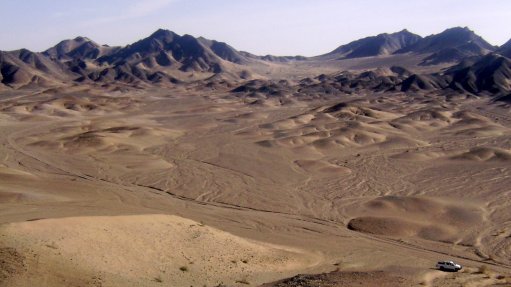Local fuel cell manufacture could accelerate South Africa’s drive for jobs
The cover picture of the December 16, 2011, edition of Mining Weekly showed the former South African President, Kgalema Motlanthe, admiring a platinum-catalysed Anglo American fuel cell, which was on display in Durban.
The 150 kW hydrogen fuel cell was generating zero-emission electricity at the United Nations Climate Change Convention’s seventeenth Conference of the Parties, where the then Anglo CEO, Cynthia Carroll, proclaimed platinum-catalysed hydrogen fuel cells as “efficient, versatile, scalable and representing proven technology that ensures clean, reliable and cost-effective electricity”.
She declared the window of opportunity “wide open” for South Africa to create “hundreds of thousands of new jobs” and simultaneously obtain a source of clean zero-emission electricity.
“With platinum at its heart, a fuel cell industry would support South Africa’s drive for jobs,” said Carroll, who was able to speak with conviction after putting a think-tank to work – the UK’s Carbon Trust – which found correctly that hydrogen fuel cells had the potential to drive development of a new industrial sector in South Africa and provide the country with the opportunity to become a major player in the global green economy.
With the appropriate levels of deployment of investment in manufacturing, insulation and maintenance activities, the trust found that the hydrogen fuel cells produced could simultaneously assist in meeting South Africa’s energy security challenges, which have since worsened, and provide off-grid rural communities with energy, without implementing an expensive national electricity grid expansion.
To recall the depth of South Africa’s lost opportunity still further is to cast one’s mind back to Anglo American’s former chairperson Harry Oppenheimer, driving around Johannesburg in a demonstration Daimler electric vehicle, well before battery electric vehicles (BEVs) were even a twinkle in Elon Musk’s eye. Electricity to power the car was provided by a Zebra battery, the patent for which was filed in 1981 and published in 1986.
The opportunity losses of the past have given way to the even bigger opportunity that is currently presenting itself, based on surging global adoption of the hydrogen economy, coupled with China creating new demand by advancing its five-year plan from being BEV-based to being based on fuel cell electric vehicles (FCEVs).
The International Energy Agency has described 2019 as a year of “unprecedented momentum” for hydrogen, with 50 policies or targets introduced globally to support its development; Beijing’s Yanqing District has two hydrogenation stations and a supporting hydrogen plant under way for the Alpine Skiing World Cup in 2020 and the 2022 Beijing Winter Olympic Games; and Tokyo has declared hydrogen FCEVs as the official transport providers to the 2020 Summer Olympic Games in Japan.
The hydrogen economy proposition is also strengthening in South Africa following what was formerly a low-carbon opportunity now becoming a no-carbon opportunity. At the heart of this improved scenario is South Africa’s superior sun, prime wind, land resources and abundance of platinum group metals, which favours the use of electrolysers to produce ‘green’ hydrogen from a wide range of water types ranging from acid mine drainage and brackish Karoo water to seawater.
South Africa has already invested significantly to keep up with developments in the fast-emerging hydrogen economy, with the State-backed Hydrogen South Africa (HySA) keeping abreast of the new liquid organic hydrogen carrier technology.This has made it possible for hydrogen to be handled in the same way as oil – using conventional oil tankers, rail tankers and road tankers for transport and underground tanks for storage.
HySA has also been operating a solar-to-hydrogen system for six years and local companies, like Isondo Precious Metals, are standing at the ready to produce membrane electrode assemblies, which form the heart of fuel cells, at the OR Tambo Special Economic Zone (SEZ) near Johannesburg.
The JSE-listed Impala Platinum has donated 16 ha of land near its refinery in Springs to the Gauteng Industrial Development Zone (IDZ), a provincial initiative that has the local manufacture of fuel cells and fuel cell components as its focal point.
The Gauteng IDZ is an extension of the OR Tambo SEZ, where investors will be incentivised to grasp the local manufacturing nettle across the full length of the hydrogen fuel cell and hydrogen electrolyser value chain. It is in this local manufacturing space that the South African economy can benefit lucratively.
As a clean and sustainable energy carrier, which produces no emissions except water, hydrogen has the potential to become a universal energy carrier, in the same way that oil is now, but without the environmental impact, which is a colossal global opportunity.
Comments
Press Office
Announcements
What's On
Subscribe to improve your user experience...
Option 1 (equivalent of R125 a month):
Receive a weekly copy of Creamer Media's Engineering News & Mining Weekly magazine
(print copy for those in South Africa and e-magazine for those outside of South Africa)
Receive daily email newsletters
Access to full search results
Access archive of magazine back copies
Access to Projects in Progress
Access to ONE Research Report of your choice in PDF format
Option 2 (equivalent of R375 a month):
All benefits from Option 1
PLUS
Access to Creamer Media's Research Channel Africa for ALL Research Reports, in PDF format, on various industrial and mining sectors
including Electricity; Water; Energy Transition; Hydrogen; Roads, Rail and Ports; Coal; Gold; Platinum; Battery Metals; etc.
Already a subscriber?
Forgotten your password?
Receive weekly copy of Creamer Media's Engineering News & Mining Weekly magazine (print copy for those in South Africa and e-magazine for those outside of South Africa)
➕
Recieve daily email newsletters
➕
Access to full search results
➕
Access archive of magazine back copies
➕
Access to Projects in Progress
➕
Access to ONE Research Report of your choice in PDF format
RESEARCH CHANNEL AFRICA
R4500 (equivalent of R375 a month)
SUBSCRIBEAll benefits from Option 1
➕
Access to Creamer Media's Research Channel Africa for ALL Research Reports on various industrial and mining sectors, in PDF format, including on:
Electricity
➕
Water
➕
Energy Transition
➕
Hydrogen
➕
Roads, Rail and Ports
➕
Coal
➕
Gold
➕
Platinum
➕
Battery Metals
➕
etc.
Receive all benefits from Option 1 or Option 2 delivered to numerous people at your company
➕
Multiple User names and Passwords for simultaneous log-ins
➕
Intranet integration access to all in your organisation


















